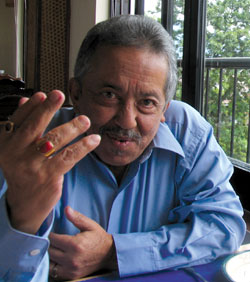 Nepali Times: We have tried dictatorship and democracy, what model of governance do you think would work best for Nepal?
Nepali Times: We have tried dictatorship and democracy, what model of governance do you think would work best for Nepal? Sharad Chandra Shaha:
I personally think this has to be participatory, all sectors of Nepali life should feel properly represented in the decision-making process. Of course, there will be trade-offs, not everything can be achieved in a given time. As long as all disparate elements in society have their say in policy formulation and some kind of possible control over how they are implemented that should guarantee accountability.
But why hasn't it worked in Nepal?
That is the million dollar question, you have the ideas of democracy and then you have the reality of present day life dictated by views of articulate people. There are no countervailing means to keep their ambitions in check. One has to be able to go along with whichever group is capable of delivering.
Is Nepal's problem one of politics or of management?
Both. The politics compounds the management problem which is mostly due to lack of proper personnel in proper places. Instead of professionalising the running of the country you put political sympathisers in key positions and it becomes a total mess.
What was the rationale behind 1 February 2005?
It was a time-bound concept with promises of delivery in areas of greatest concerns to Nepalis and above politics, so it had a chance of success. Of course in hindsight there can be different angles and opinions, but in the beginning it was a genuine effort to listen to all sorts of public opinion and a true desire to incorporate them in policy formulation and implementation.
Where did this start going wrong?
It's not for me to assign blame, but maybe there weren't enough effective initiatives to convince our foreign friends and those who listen to them.
But as an adviser to King Gyanendra, couldn't you have helped correct these mistakes?
I'd like to categorically state that I was not King Gyanendra's adviser. It was not my place to advise him about foreign policy, or the running of the country for that matter.
Then to what do you attribute the public perception that you were a close adviser to the king?
I have stated in answer to your previous question what I have to say and I'd suggest that people go back and analyse the intention of the sources that said what they did about me. Why not look into the possible motives behind those who say I was his adviser?
So who were the real advisers?
I don't know who they are and anyway it's too close to the event to air my opinion or assign blame.
There has been a report of your alleged involvement in the army's purchase of two Chinese planes. Is this true?
Through your own newspaper, I would like to categorically state that I have never been involved in any aircraft purchase, I have no idea about it and if anybody can prove my involvement in this deal I'm prepared to face any consequences, otherwise I'd like you to clear my name from any association with such a shady deal.
Not even your family members and associates are involved?
No. I don't even know who is behind the purchase of the aeroplanes. I'd like to request people to find out who spreads these kinds of rumours and for what sinister purpose. That would be a great favour to me from my countrymen.
You also headed the Information Technology Task Force.
I was involved for roughly two-and-half years in promoting Information Technology in Nepal and despite problems we were making slow and steady progress. It has tremendous potential, and if there is proper planning from an elementary level in education, proper policies, removal of red tape, and realising the inherent potential of this country for FDI opportunities there could be a bright future. We have the geographical and natural advantages, low costs, for software development, downstream jobs and call centres all leading to tremendous international employment opportunities.
But the crackdown on the internet in February opened Nepal up to criticism at the World Summit of the Information Society that King Gyanendra and you attended in Tunis last year?
Not that I condoned it, but the curbs weren't that stringent and it didn't last for a long period. And for your information, there was no criticism in Tunis. Compared to the practice of other countries in this sector, it pales into insignificance.


